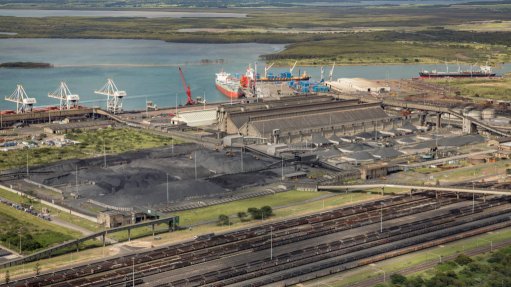Opinion: The collapse of the Steel Master Plan and disintegration of industry
In this opinion article, Steel and Engineering Industries Federation of Southern Africa (Seifsa) president Elias Monage writes about the importance of the steel industry and the challenges the South African steel industry is facing.
The steel industry is the backbone of any economy, it forms the foundation of any modern economy and is essential to every single sector. Without a healthy and vibrant local steel industry, South Africa will simply not be able to integrate and develop itself or the rest of the continent. The steel sector – and South Africa – urgently needs clarity on policies, consensus on action plans and realised deliverables on the ground in order to instil confidence in the viability of the country to boost competitiveness and attract both local and foreign direct investment.
The recent announcement by ArcelorMittal South Africa on the potential closure of its operations in Newcastle and Vereeniging, as well as ArcelorMittal Rail and Structural presents a major set-back to the base of the industrial sector and industrialisation more broadly. This development also raises the sharp question whether the grand aspirations of the Steel Master Plan (SMP) to reindustrialise the steel industry are beginning to disintegrate under our watch. The unfortunate reality is that the lofty goals set by the SMP to charter a roadmap to reenergise the sector, expand production and demand across the steel and fabrication value chain are becoming increasingly illusive. There is a growing sense on the part of industry that the SMP has collapsed.
The SMP was pitched as the platform through which all the stakeholders, namely, government, business and labour, who have a direct and vested interest in seeing this industry prosper, would come together and work collaboratively to meet this end. The plan was sold as a deviation from the old and unproductive approach where government directs the path which industry should take and one where different stakeholders lobby the government toward their respective ends in an unstructured way. It was meant to be a unifying platform, where meaningful and active collaboration took place to arrest the rapid decline currently being experienced by the industry through short-term interventions and to grow the industry through longer dated interventions. Importantly, it was also meant to open avenues of communication and collaboration between all stakeholders.
The metals and engineering industries, and particularly the constituency I represent through Seifsa, fully committed itself to the SMP when it was launched in 2021. Seifsa was a signatory to the founding document and nominated a number of captains of industry to lead various workstreams. The Seifsa team has invested considerable resources to the work of the SMP unlike some of the nay-sayers that wrote-off SMP at the outset.
Over the last year, Seifsa has made numerous formal requests for a meeting with Trade, Industry and Competition Minister Ebrahim Patel on the scrap metal export ban and other much wider and arguably more important and strategic industrial policy concerns. Disappointingly, the meetings have not materialised and our requests have fallen on deaf ears.
We understand and acknowledge that Ministers leading key departments and portfolios are extremely busy, but what we cannot accept is the lack of decisive leadership from the Department of Trade, Industry and Competition (dtic), resulting in numerous decisions being strung out and not forthcoming. That said, it is ironic that some decisions, like the ban on scrap metal exports – with all its adverse implications – received priority preference and relatively fast decision turn-around times. A further concern to business is the delays in appointing permanent staff to critical decision-making roles. A significant number of dtic staff, in key decision-making roles, hold them in an acting capacity and this in part contributes to the delays on decision-making.
Public consultation processes on regulations which are often undertaken when it is seemingly clear that a decision has already been taken. This suspicion on the part of business is supported by the unwillingness of the ministry to engage industry on a more in-depth basis on some of the more rational proposals submitted by industry, as in the case of the scrap metal export ban. Moreover, relating to the same scrap metal export ban there has been a very concerning shift in the goal posts where the motivation to extend the export ban is now leaning to input cost support for the scrap-based mills and the country’s decarbonisation efforts, whereas the original reasons used to force the decision through were of a security nature and protection of infrastructure. Introducing industrial policy by stealth and misleading economic signals as in this case, renders the SMP as a platform to rubber-stamp and legitimise decisions, including those that do not enjoy support and alignment by a significant block of employers.
Overarching all of this is the fact that the SMP was meant to deliver a comprehensive industrial policy framework, where a total industry perspective would be taken and complementarities across the value chain enhanced. Sadly, what we are witnessing is the opposite, wherein policy is implemented in a fragmented manner, with a short-term view and with pockets of industry being pitted against one another. The scrap metal export ban is one such divisive and market distorting development.
The industry is quickly losing faith in the SMP process, and it is obvious but worth mentioning that the withdrawal of this constituency from the SMP would virtually render the plan moot.
Industry simply cannot continue to invest the amount of time, effort and resources as it has done thus far for altruistic reasons, particularly when the experienced reality is one of a continued deterioration of the business and operating environment, company closures and job losses.
Article Enquiry
Email Article
Save Article
Feedback
To advertise email advertising@creamermedia.co.za or click here
Announcements
What's On
Subscribe to improve your user experience...
Option 1 (equivalent of R125 a month):
Receive a weekly copy of Creamer Media's Engineering News & Mining Weekly magazine
(print copy for those in South Africa and e-magazine for those outside of South Africa)
Receive daily email newsletters
Access to full search results
Access archive of magazine back copies
Access to Projects in Progress
Access to ONE Research Report of your choice in PDF format
Option 2 (equivalent of R375 a month):
All benefits from Option 1
PLUS
Access to Creamer Media's Research Channel Africa for ALL Research Reports, in PDF format, on various industrial and mining sectors
including Electricity; Water; Energy Transition; Hydrogen; Roads, Rail and Ports; Coal; Gold; Platinum; Battery Metals; etc.
Already a subscriber?
Forgotten your password?
Receive weekly copy of Creamer Media's Engineering News & Mining Weekly magazine (print copy for those in South Africa and e-magazine for those outside of South Africa)
➕
Recieve daily email newsletters
➕
Access to full search results
➕
Access archive of magazine back copies
➕
Access to Projects in Progress
➕
Access to ONE Research Report of your choice in PDF format
RESEARCH CHANNEL AFRICA
R4500 (equivalent of R375 a month)
SUBSCRIBEAll benefits from Option 1
➕
Access to Creamer Media's Research Channel Africa for ALL Research Reports on various industrial and mining sectors, in PDF format, including on:
Electricity
➕
Water
➕
Energy Transition
➕
Hydrogen
➕
Roads, Rail and Ports
➕
Coal
➕
Gold
➕
Platinum
➕
Battery Metals
➕
etc.
Receive all benefits from Option 1 or Option 2 delivered to numerous people at your company
➕
Multiple User names and Passwords for simultaneous log-ins
➕
Intranet integration access to all in your organisation





















